Editorial: What the D.A.’s report on the Ezell Ford shooting didn’t say: LAPD must do better

- Share via
In a report 2½ years in the making, Los Angeles Dist. Atty. Jackie Lacey said Tuesday that the two Los Angeles police officers involved in the fatal shooting of Ezell Ford on Aug. 11, 2014, acted in self-defense and did not commit a crime.
Yet it’s important to take note of some things that Lacey did not say, simply because as a criminal prosecutor it is not her place to say them.
Lacey did not say that justice was done, or that everything in the incident went as it should. In fact, the Los Angeles Police Commission — whose business it indeed is to weigh in on such questions — found in June 2015 that one of the officers broke department policy by stopping Ford, physically restraining him and setting in motion the chain of events that led to the shooting.
Even that question is not a simple one, and LAPD Chief Charlie Beck disagreed with the finding. Ford lived in an area of high gang and criminal activity, and Beck’s strategy, backed by the city’s political leadership, has been to flood such hotspots with officers. Once there, they have a limited range of options to protect residents from crime, and many of those options put them in the position not just as protectors of the community but as its irritants, or worse. Aggressive policing means “consensual” stops to ask questions, but in a heavily policed neighborhood, a request from an armed, uniformed police officer surely comes across as something less than friendly, and stopping to answer questions would hardly seem voluntary.
Stops can easily go bad, especially when the subject is in poor mental health, as was the case with Ford. But let’s be frank — they can go bad with any population that has a rational mistrust of police and is tired of being repeatedly flagged down by officers who say things like, “Hey, let me talk with you,” as one officer reportedly told Ford.
In her report Lacey did not say whether it’s acceptable to live in a neighborhood where people have to put up with that kind of police intrusiveness, or with the crime that makes it necessary, but let’s say it: It is not — but neither is it entirely clear what to do about it. The police cannot simply let crime go unchecked.
Nor did Lacey say, although the rest of us must, that the LAPD must do better. Although not every police killing of an unarmed African American man is an act of murder — in fact, few such killings are — neither can any be simply written off as an unfortunate and unavoidable incident that is the tragic lot of people because of their race, their income or their neighborhood.
Follow the Opinion section on Twitter @latimesopinion and Facebook
More to Read
A cure for the common opinion
Get thought-provoking perspectives with our weekly newsletter.
You may occasionally receive promotional content from the Los Angeles Times.










